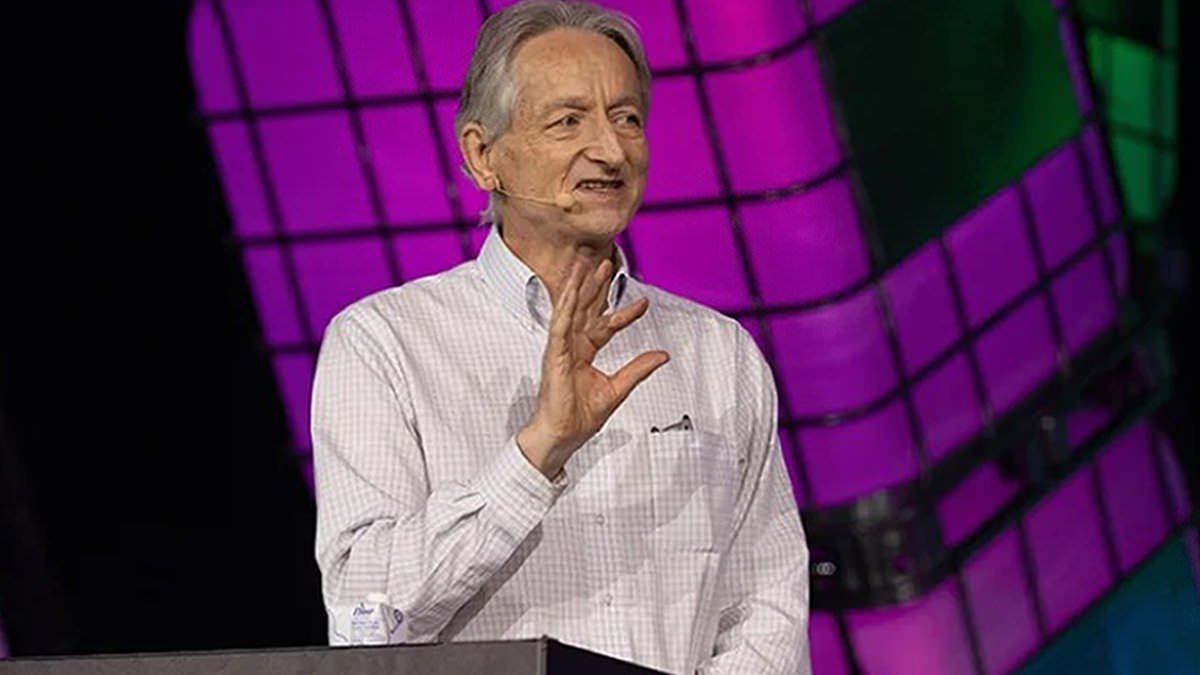He dedicated his life to the development and use of artificial intelligence and his groundbreaking work has garnered him a Nobel Prize.
But now Geoffrey Hinton, 76, regrets building the thing that earnt him this success.
‘The Godfather of AI’ was awarded the 2024 Nobel Prize in Physics alongside John Hopfield on Tuesday after they developed the methods which laid the foundations for the powerful systems which run everything from ChatGPT to Apple Intelligence.
Dr Hinton, who was born in London, said he was ‘flabbergasted’ to have received the award – making him the second person in history to win a Nobel Prize and the Turing Award, often dubbed the Nobel for computing.
Having spent decades building the technology system which many see as important as the introduction of the web browser in the early 1990s, Dr Hinton has spent the last few years speaking out about the ‘existential risk’ posed to humanity by AI.
In order to speak about the dangers of this technology, Dr Hinton resigned from his role at Google in 2022, having worked at the company for ten years.
But the pioneering scientist says he still feels some regrets about introducing the technology to the world.
He told The Telegraph: ‘There is the kind where you feel guilty because you do something you know you shouldn’t have done, and then there’s regret where you do something you would do again in the same circumstances but it may in the end not turn out well.
‘That second regret I have. In the same circumstances I would do the same again but I am worried that the overall consequence of this is that systems more intelligent than us eventually take control.’
Having gone to school at Clifton College in Bristol and later studying at the University of Cambridge, Hinton’s career as an academic began back in 1972 as a PhD student at the University of Edinburgh.
Whilst in Scotland, he began lifelong work on an idea called a neural network – a mathematical system that learns skills by analyzing data, which very few researchers believed in at the time.
Dr Hinton’s work in the 1980s involved inventing a method that can autonomously find properties in data and identify specific elements in pictures.
Fellow award winner Dr Hopfield, of Princeton University, invented the first methods which allowed machine learning systems to save and recreate patterns.
Dr Hinton gave these networks the ability to find specific properties, allowing them to complete tasks like recognising elements in pictures.
Their discoveries paved the way for the artificial neural networks which power the A.I systems we see today.
Most modern AIs are based on these artificial neural networks which mimic the connections between neurons in the brain.
In the AI, the neurons are represented by nodes which influence each other through connections which can be made weaker or stronger – allowing AIs to learn over time.
Without this technology, the powerful systems which run everything from ChatGPT to Apple Intelligence would not be possible.
During that decade, Dr Hinton left his role as a professor of computer science at Carnegie Mellon University as he was reluctant to take funding from the Defence Department of the US Government, having been deeply opposed to the use of artificial intelligence on the battlefield.
At the University of Toronto in 2012, Dr. Hinton and two of his students – Ilya Sutskever and Alex Krishevsky – built a neural network that could analyze thousands of photos and teach itself to identify common objects, such as flowers, dogs and cars.
This system would land the trio the coveted Turing Award and see Google spend $44 million to acquire this network and use it to create their increasingly powerful technologies.
At this stage Dr Hinton was onboard with AI’s usage in society and backed the building of neural networks that learned from huge amounts of digital text, claiming it was a powerful way for machines to understand and generate language.
However, his view changed when Google and OpenAI built systems using much larger amounts of data which he thought had the capacity to eclipse human intelligence.
Speaking to journalists yesterday, Dr Hinton said: ‘It’s going to be like the Industrial Revolution – but instead of our physical capabilities, it’s going to exceed our intellectual capabilities.
‘But I worry that the overall consequences of this might be systems that are more intelligent than us that might eventually take control.’
It is not all doom and gloom when it comes to discussing AI with Dr Hinton. He still believes the technology will lead to ‘huge improvements’ in productivity and efficiency, as well as breakthroughs in areas ranging from drug research to education.
He also added that he was a fan of ChatGPT, saying he now uses it for many things in his day-to-day life but that it doesn’t always get facts right.
But the tech guru also has concerns that the internet will be flooded with false photos, videos and text, leaving the average person ‘not being able to know what is true anymore.’
‘The idea that this stuff could actually get smarter than people — a few people believed that,’ he told the New York Times last year.
‘But most people thought it was way off. And I thought it was way off. I thought it was 30 to 50 years or even longer away. Obviously, I no longer think that.’
Whilst he may have feelings of regret towards his work, it cannot be overestimated the importance of Dr Hinton and Dr Hopefield’s findings laid the basis for some of the most important innovations in recent history.
As part of the award, the pair will share a prize fund of 11m Swedish kronor (£810,000).
Dr Hopfield, who at 91 is among the oldest Nobel Prize winners, is yet to comment on the award.
